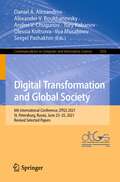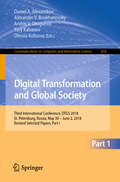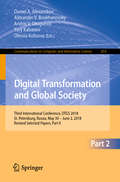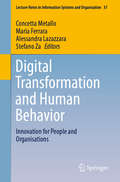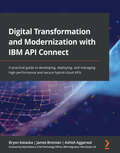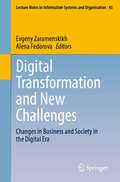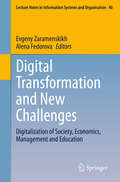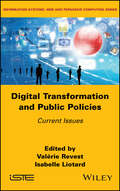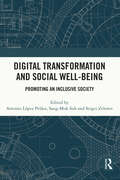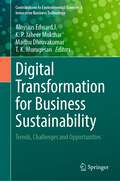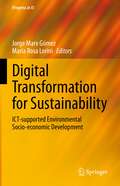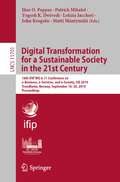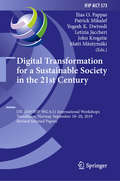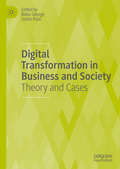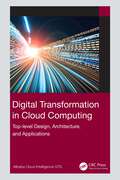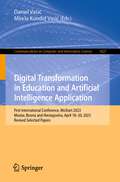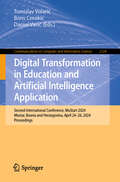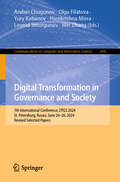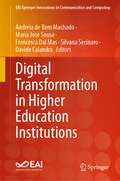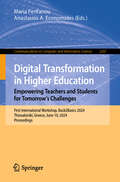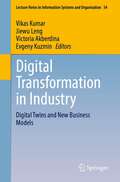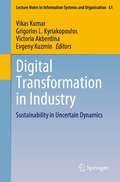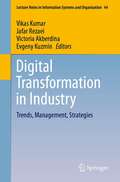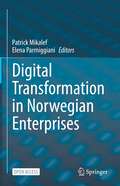- Table View
- List View
Digital Transformation and Global Society: 6th International Conference, DTGS 2021, St. Petersburg, Russia, June 23–25, 2021, Revised Selected Papers (Communications in Computer and Information Science #1503)
by Olessia Koltsova Andrei V. Chugunov Yury Kabanov Daniel A. Alexandrov Alexander V. Boukhanovsky Ilya Musabirov Sergei PashakhinThis volume constitutes refereed proceedings of the 6th International Conference on Digital Transformation and Global Society, DTGS 2021, held as a virtual event in June 2021. Due to the COVID-19 pandemic the conference was held online. The 34 revised full papers and 4 short papers presented in the volume were carefully reviewed and selected from 95 submissions. The papers are organized in topical sections on eSociety: social informatics and digital inclusion issues; ePolity: e-governance and regulation; eCity: smart cities and urban planning; eHumanities: digital education and research methods; eCommunication: online discources and attitudes; eEconomy: challenges of the COVID-19 pandemic; eEconomy: e-commerce research.
Digital Transformation and Global Society: Third International Conference, DTGS 2018, St. Petersburg, Russia, May 30 – June 2, 2018, Revised Selected Papers, Part I (Communications in Computer and Information Science #858)
by Olessia Koltsova Andrei V. Chugunov Yury Kabanov Daniel A. Alexandrov Alexander V. BoukhanovskyThis two volume set (CCIS 858 and CCIS 859) constitutes the refereed proceedings of the Third International Conference on Digital Transformation and Global Society, DTGS 2018, held in St. Petersburg, Russia, in May/June 2018.The 75 revised full papers and the one short paper presented in the two volumes were carefully reviewed and selected from 222 submissions. The papers are organized in topical sections on e-polity: smart governance and e-participation, politics and activism in the cyberspace, law and regulation; e-city: smart cities and urban planning; e-economy: IT and new markets; e-society: social informatics, digital divides; e-communication: discussions and perceptions on the social media; e-humanities: arts and culture; International Workshop on Internet Psychology; International Workshop on Computational Linguistics.
Digital Transformation and Global Society: Third International Conference, DTGS 2018, St. Petersburg, Russia, May 30 – June 2, 2018, Revised Selected Papers, Part II (Communications in Computer and Information Science #859)
by Olessia Koltsova Andrei V. Chugunov Yury Kabanov Daniel A. Alexandrov Alexander V. BoukhanovskyThis two volume set (CCIS 858 and CCIS 859) constitutes the refereed proceedings of the Third International Conference on Digital Transformation and Global Society, DTGS 2018, held in St. Petersburg, Russia, in May/June 2018.The 75 revised full papers and the one short paper presented in the two volumes were carefully reviewed and selected from 222 submissions. The papers are organized in topical sections on e-polity: smart governance and e-participation, politics and activism in the cyberspace, law and regulation; e-city: smart cities and urban planning; e-economy: IT and new markets; e-society: social informatics, digital divides; e-communication: discussions and perceptions on the social media; e-humanities: arts and culture; International Workshop on Internet Psychology; International Workshop on Computational Linguistics.
Digital Transformation and Human Behavior: Innovation for People and Organisations (Lecture Notes in Information Systems and Organisation #37)
by Stefano Za Alessandra Lazazzara Concetta Metallo Maria FerraraThe digital transformation is impacting various aspects of how we live and work. Due to the pervasive effects of the digital revolution on firms and societies, both scholars and practitioners are interested in better understanding the key mechanisms behind the related challenges. This book presents a collection of research papers focusing on the relationships between technologies (e.g. artificial intelligence, social media, and the Internet of Things) and behaviours (e.g. social learning, knowledge sharing, and decision-making). Moreover, it provides insights into how the digital transformation may improve quality of personal life and work life within public and private organisations. The plurality of views offered makes this book particularly relevant for practitioners, companies, scientists, and governments. It gathers a selection of the best papers - original double-blind peer-reviewed contributions - presented at the annual conference of the Italian chapter of the AIS which was held in Naples, Italy, in September 2019.
Digital Transformation and Modernization with IBM API Connect: A practical guide to developing, deploying, and managing high-performance and secure hybrid-cloud APIs
by Matt Roberts James Brennan Bryon Kataoka Ashish AggarwalSuccessfully execute a strategic roadmap of digital transformation and modernize your enterprise with a proven API-led agile implementation approach by unlocking the full range of features in IBM API Connect Version 10Key FeaturesExplore techniques to design and deliver valuable customer-centric APIs using API ConnectManage your APIs with improved security and optimal performance across many channelsUncover hidden capabilities that help improve business agility and management within your API ecosystemBook DescriptionIBM API Connect enables organizations to drive digital innovation using its scalable and robust API management capabilities across multi-cloud and hybrid environments. With API Connect's security, flexibility, and high performance, you'll be able to meet the needs of your enterprise and clients by extending your API footprint. This book provides a complete roadmap to create, manage, govern, and publish your APIs. You'll start by learning about API Connect components, such as API managers, developer portals, gateways, and analytics subsystems, as well as the management capabilities provided by CLI commands. You'll then develop APIs using OpenAPI and discover how you can enhance them with logic policies. The book shows you how to modernize SOAP and FHIR REST services as secure APIs with authentication, OAuth2/OpenID, and JWT, and demonstrates how API Connect provides safeguards for GraphQL APIs as well as published APIs that are easy to discover and well documented. As you advance, the book guides you in generating unit tests that supplement DevOps pipelines using Git and Jenkins for improved agility, and concludes with best practices for implementing API governance and customizing API Connect components. By the end of this book, you'll have learned how to transform your business by speeding up the time-to-market of your products and increase the ROI for your enterprise.What you will learnUse API Connect to create, manage, and publish customer-centric, API-led solutionsRun CLI commands to manage API configuration and deploymentsCreate REST, SOAP, and GraphQL APIs securely using OpenAPISupport OAuth and JWT security methods using policiesCreate custom policies to supplement securityApply built-in policies to transform payloadsUse CLIs and unit testing hooks within DevOps pipelinesFind out how to customize Analytics dashboards and Portal User InterfaceWho this book is forThis book is for developers and architects who want to achieve digital transformation using IBM API Connect and successfully execute the strategic roadmap of enterprise modernization while effectively managing their API ecosystem. A solid understanding of what RESTful services and APIs can do and where to implement API security is necessary to get started. Experience in application development and basic knowledge of microservices, container orchestration, and cloud environments will help you to get the most out of this book.
Digital Transformation and New Challenges: Changes in Business and Society in the Digital Era (Lecture Notes in Information Systems and Organisation #45)
by Evgeny Zaramenskikh Alena FedorovaThis book gathers the best papers presented at the second conference held by the Russian chapter of the Association for Information Systems (AIS), which took place in Yekaterinburg, Russian Federation, in December 2019. It shares the latest insights into various aspects of the digitalization of the economy and the consequences of transformation in public administration, business and public life. Integrating a broad range of analytical perspectives, including economic, social and technological, this interdisciplinary book is particularly relevant for scientists, digital technology users, companies and public institutions.
Digital Transformation and New Challenges: Digitalization of Society, Economics, Management and Education (Lecture Notes in Information Systems and Organisation #40)
by Evgeny Zaramenskikh Alena FedorovaThis book gathers the best papers presented at the first conference held by the Russian chapter of the Association for Information Systems (AIS). It shares the latest insights into various aspects of the digitalization of the economy and the consequences of transformation in public administration, business and public life. Integrating a broad range of analytical perspectives, including economic, social and, technological, this interdisciplinary book is particularly relevant for scientists, digital technology users, companies and public institutions.
Digital Transformation and Public Policies
by Isabelle Liotard Valérie RevestThe extent of digitalization and the use of digital tools no longer need to be demonstrated. While companies have been integrating the challenges of such a transformation for more than 20 years, the public sector is lagging behind. Digital Transformation and Public Policies studies the mechanisms of the digital transformation of public organizations. It explores how this new deal, driven mainly by platforms, resonates with new public policies and how digital technology is redrawing the relationship between the governors and the governed. This book, the result of transdisciplinary collaboration between researchers, aims to answer these questions by focusing on several cases: public innovation policies, health data and social policies with fiscal microsimulation devices.
Digital Transformation and Social Well-Being: Promoting an Inclusive Society
by Antonio López Peláez Sergei Zelenev Sang-Mok SuhThis is the first book to show how digitalisation and the better provision of information and communication technologies (ICTs) can improve access to a wide-range of social services, as well as make them more inclusive. Overcoming disparities across social groups using contemporary digitalisation models will have lasting consequences on social well-being and human welfare.Reflecting on current trends the authors vividly illustrate the collective, global nature of the challenge that digitalisation represents for providers, administrators and users of welfare services. It is important, therefore, to bear in mind the following for research design and practice: • Citizens' rights must be protected. • Consideration should be given to how the services provided can be improved by more effective use of ICTs. • Digital interventions require better service coordination in the setting of priorities and specific training in digital skills for service providers and service users. The chapters in this book address these problems and challenges in great depth, analysing the role of ICTs in promoting social inclusion and social welfare, drawing on examples of successful ICT applications around the world. The book contains country case-studies from the United States, Brazil, India, the Republic of Korea, Taiwan, Hong Kong (China), Zimbabwe, Morocco, Spain, Portugal, Ireland and Singapore and will be of interest to all scholars and students of social policy, to social work educators, and social care providers.
Digital Transformation for Business Sustainability: Trends, Challenges and Opportunities (Contributions to Environmental Sciences & Innovative Business Technology)
by K. P. Jaheer Mukthar Aloysius Edward J. Madhu Dhruvakumar T. K. MurugesanThis book explores how digital technologies can be used to drive sustainable business practices and achieve long-term business success. It offers insights and practical strategies and guidance that can help businesses adapt to the digital age, optimize their operations, and create new opportunities for growth. The book further provides real-world examples that illustrate how businesses can leverage digital technologies to achieve long-term sustainability and success. The book is an essential read for business leaders, managers, academician, practitioners and entrepreneurs who are looking to drive sustainable digital transformation within their organizations. The book covers a wide range of topics, including:1) Understanding the digital landscape: The book provides an overview of the digital technologies that are transforming business operations, such as artificial intelligence, cloud computing, and the Internet of Things. It explores how these technologies can be leveraged to create sustainable business practices that benefit both the organization and society.2) Building a digital strategy for sustainability: The book offers guidance on how businesses can develop a digital strategy that aligns with their sustainability goals. It covers topics such as identifying digital opportunities, setting targets, and measuring performance.3) Embedding sustainability into digital operations: The book explores how businesses can integrate sustainability into their digital operations, such as data management, supply chain management, and product design. It provides examples of companies that have successfully implemented sustainable digital practices.4) Digital innovation for sustainability: The book discusses how businesses can use digital innovation to create new opportunities for sustainability. It covers topics such as circular economy business models, sustainable product design, and social innovation.5) Leading for sustainable digital transformation: The book offers insights on how business leaders can drive sustainable digital transformation within their organizations. It covers topics such as leadership skills, organizational culture, and stakeholder engagement.
Digital Transformation for Fashion and Luxury Brands: Theory and Practice
by Wilson Ozuem Silvia Ranfagni Michelle WillisThis book re-evaluates the diffusion and positioning of fashion and luxury brands following the impact and disruption of digital transformations, particularly on existing omni-channel models and touchpoints and consumer behaviours. By exploring the importance of digital transformation and discussing the benefits and challenges it has created for the fashion industry, this book provides insights into the role of various digital technologies, systems and strategies in generating and maintaining brand value and equity, customer engagement and experiences and connecting the marketplace and marketspace. Chapter 16 is available open access under a Creative Commons Attribution 4.0 International License via Springer Link.
Digital Transformation for Sustainability: ICT-supported Environmental Socio-economic Development (Progress in IS)
by Jorge Marx Gómez Maria Rosa LoriniThis book presents case studies to analyse the relationship between sustainability – environmental, social, institutional and economic – and digital innovation. The respective contributions offer a contextualisation of the main present and future trends concerning these two elements, and present analyses from economic, technical, managerial, and social perspectives alike. The individual sections of the book focus on interactions between sustainability and digital innovation in existing organisations and highlight the new opportunities, challenges and threats that may emerge as a result. The contributions are mainly based on case studies and research conducted in Europe and Africa, with a few focusing on Southeast Asia and Central America, and were prepared by experts in the fields of Information Systems, Computer Science, Social Development, and Economics.
Digital Transformation for a Sustainable Society in the 21st Century: 18th IFIP WG 6.11 Conference on e-Business, e-Services, and e-Society, I3E 2019, Trondheim, Norway, September 18–20, 2019, Proceedings (Lecture Notes in Computer Science #11701)
by Yogesh K. Dwivedi John Krogstie Matti Mäntymäki Letizia Jaccheri Ilias O. Pappas Patrick MikalefThis book constitutes the proceedings of the 18th IFIP WG 6.11 Conference on e-Business, e-Services, and e-Society, I3E 2019, held in Trondheim, Norway, in September 2019. The total of 61 full and 4 short papers presented in this volume were carefully reviewed and selected from 138 submissions. The papers were organized in topical sections named: e-business; big data analytics, open science and open data; artificial intelligence and internet of things; smart cities and smart homes, social media and analytics; digital governance; digital divide and social inclusion; learning and education; security in digital environments; modelling and managing the digital enterprise; digital innovation and business transformation; and online communities.
Digital Transformation for a Sustainable Society in the 21st Century: I3E 2019 IFIP WG 6.11 International Workshops, Trondheim, Norway, September 18–20, 2019, Revised Selected Papers (IFIP Advances in Information and Communication Technology #573)
by Yogesh K. Dwivedi John Krogstie Matti Mäntymäki Letizia Jaccheri Ilias O. Pappas Patrick MikalefThis book constitutes papers from the workshops held at the 18th IFIP WG 6.11 Conference on e-Business, e-Services, and e-Society, I3E 2019, which took place in Trondheim, Norway, in September 2019. The 11 full papers and 4 short papers presented in this volume were carefully reviewed and selected from 33 submissions to the following workshops:DTIS: Digital Transformation for an Inclusive SocietyTPSIE: Trust and Privacy Aspects of Smart Information Environments3(IT): Innovative Teaching of Introductory Topics in Information TechnologyCROPS: CROwd-Powered e-Services
Digital Transformation in Business and Society: Theory and Cases
by Justin Paul Babu GeorgeThe digital traces that people leave behind as they conduct their daily lives provide a powerful resource for businesses to better understand the dynamics of an otherwise chaotic society. Digital technologies have become omnipresent in our lives and we still do not fully know how to make the best use of the data these technologies could harness. Businesses leveraging big data appropriately could definitely gain a sustainable competitive advantage. With a balanced mix of texts and cases, this book discusses a variety of digital technologies and how they transform people and organizations. It offers a debate on the societal consequences of the yet unfolding technological revolution and proposes alternatives for harnessing disruptive technologies for the greater benefit of all. This book will have wide appeal to academics in technology management, strategy, marketing, and human resource management.
Digital Transformation in Cloud Computing: Top-level Design, Architecture, and Applications
by Alibaba Cloud GTSWith the rapid development of cloud computing and digital transformation, well-designed cloud-based architecture is always in urgent need. Illustrated by project cases from the Chinese technology company Alibaba, this book elaborates how to design a cloud-based application system and build them on the cloud. Cloud computing is far from being just a resource provider; it offers database, storage and container services that can help to leverage key advantages for business growth. Based on this notion, authors from the Alibaba Cloud Global Technology Services introduce new concepts and cutting-edge technology in the field, including cloud-native, high-availability and disaster tolerance design on cloud, business middle office, data middle office, and enterprise digital transformation. Resting upon Alibaba’s years of practice and achievements in the field of cloud technology, the volume also elucidates the methodology and practice solutions of digital construction, including methodology, product tools, technical processes, architecture design, cloud application capacity assessment and optimization, etc. The book will appeal to researchers, students, and especially IT practitioners, professionals, and managers interested in cloud computing, digital transformation, cloud migration, business middle office, data middle office, as well as the Alibaba Cloud itself.
Digital Transformation in Education and Artificial Intelligence Application: First International Conference, MoStart 2023, Mostar, Bosnia and Herzegovina, April 18–20, 2023, Revised Selected Papers (Communications in Computer and Information Science #1827)
by Daniel Vasić Mirela Kundid VasićThis book constitutes selected papers presented during the First International Conference on Digitization in Education, MoStart 2023, held in Mostar, Bosnia and Herzegovina, in April 2023.The 12 presented papers were thoroughly reviewed and selected from the 30 submissions. The proceedings cover a diverse range of topics, including artificial intelligence and robotics in education, games and simulations, intelligent tutoring systems, augmented and virtual reality, natural language processing, computer vision, IoT and metaverse applications, learning analytics, deep learning, and ethical issues in AI applications in education and law.
Digital Transformation in Education and Artificial Intelligence Application: Second International Conference, MoStart 2024, Mostar, Bosnia and Herzegovina, April 24–26, 2024, Proceedings (Communications in Computer and Information Science #2124)
by Daniel Vasić Tomislav Volarić Boris CrnokićThis book constitutes selected papers presented during the Second International Conference on Digital Transformation in Education and Artificial Intelligence Applications, MoStart 2024, held in Mostar, Bosnia and Herzegovina, in April 2024. The 17 papers were selected from the 32 submissions. The proceedings cover a broad range of topics, computer vision, natural language processing, and the latest advancements in the digital transformation of education. Notably, the application of artificial intelligence, the incorporation of gamification and robotics into learning processes, and innovative technologies such as IoT, have been thoroughly explored.
Digital Transformation in Governance and Society: 7th International Conference, DTGS 2024, St Petersburg, Russia, June 24–26, 2024, Revised Selected Papers (Communications in Computer and Information Science #2445)
by Wei Zhang Yury Kabanov Andrei Chugunov Olga Filatova Harekrishna Misra Leonid SmorgunovThis book constitutes refereed proceedings of the 7th International Conference on Digital Transformation in Governance and Society, DTGS 2024, held in St. Petersburg, Russia in June 24–26, 2024. The 10 full papers presented in this volume were carefully reviewed and selected from 35 submissions. These papers deal with various aspects of Digital transformation in governance and society, focusing on digital governance, smart cities, and communication on social media, with a special emphasis on the experience of developing countries.
Digital Transformation in Higher Education Institutions (EAI/Springer Innovations in Communication and Computing)
by Silvana Secinaro Maria José Sousa Andreia de Bem Machado Francesca Dal Mas Davide CalandraThis book analyzes digital technologies being used in the teaching-learning process. The authors show how the use of AI in higher education can provide personalized education through the automation of administrative teaching tasks, software programs that favor the detection of topics that need reinforcement in the classroom, the guidance and support of students outside the classroom, and the use of data intelligently to teach and support students. In addition, the authors show how to further personalize education with the use of augmented reality, adaptive platforms, intelligent tutor systems, Chatbots, adaptive learning, computer aided instruction, MOOCs, and robotics. The authors answer questions such as: What sustainable educational technologies can be used in the teaching-learning process; How can Blockchain technology and AI be applied in higher education; How can the metaverse be applied in virtual learning environments? The book is relevant to researchers, professionals, andstudents interested in technology and education.
Digital Transformation in Higher Education. Empowering Teachers and Students for Tomorrow’s Challenges: First International Workshop, Back2Basics 2024, Thessaloniki, Greece, June 10, 2024, Proceedings (Communications in Computer and Information Science #2247)
by Maria Perifanou Anastasios A. EconomidesThis book constitutes the refereed proceedings of the First International Workshop on Digital Transformation in Higher Education. Empowering Teachers and Students for Tomorrow’s Challenges, Back2Basics 2024, held in Thessaloniki, Greece, on June 10, 2024. This workshop was part of the 20th International Conference on Intelligent Tutoring Systems (ITS 2024), which took place in Thessaloniki on June 10–13, 2024. The 06 full papers here were thoroughly reviewed and selected from a total of 09 submissions. This interdisciplinary event brought together researchers and educators from various European higher education institutions to address the challenges and opportunities of digital transformation in higher education (HE).
Digital Transformation in Industry: Digital Twins and New Business Models (Lecture Notes in Information Systems and Organisation #54)
by Vikas Kumar Victoria Akberdina Evgeny Kuzmin Jiewu LengThis book offers a selection of the best papers presented at the annual international scientific conference “Digital Transformation in Industry: Trends, Management, Strategies (DTI2021),” held by the Institute of Economics, Ural Branch of the Russian Academy of Sciences, in Ekaterinburg (Russia) on October 29, 2021. The book focuses on the idea of introduction mechanisms for digitization processes and on highlighting successful digital transformation strategies in all sectors of industry. Key topics include the development of a cyber-physical production system for Industry 4.0; digital design technologies for enhancing the competitiveness of products and companies; digital twin-driven product manufacturing and services; and the effects of the industrial digital transformation on society and the environment. With regard to implementing IT and other technological innovations, lessons learned in developed and developing economies, as well as small and large enterprises, are included. Given its scope, the book offers a valuable asset for researchers and managers of industrial organizations alike.
Digital Transformation in Industry: Sustainability in Uncertain Dynamics (Lecture Notes in Information Systems and Organisation #61)
by Vikas Kumar Grigorios L. Kyriakopoulos Victoria Akberdina Evgeny KuzminThis book offers a selection of the best papers presented at the annual international scientific conference “Digital Transformation in Industry: Trends, Management, Strategies,” which was held by the Institute of Economics of the Ural Branch of the Russian Academy of Sciences (Ekaterinburg, Russia) on October 28, 2022.The book focuses on concepts for initiating digitalization processes and identifying successful digital transformation strategies in all sectors of industry. Key topics include the sustainability of digital transformation in uncertain dynamics; conditions of uncertainty and barriers; industrial logistics in the new reality; best practices for implementing digital solutions to ensure sustainable, barrier-free and flexible supply chains; the achievement of sustainability in the process of digital transition; the adaptation of enterprises to the ESG concept through digital solutions; assessing the impact of industrial digital transformation on society and the environment; and clarifying how ESG aspects affect the economy. The experiences of various countries, regions and types of enterprise implementing IT and other technological innovations are also included, making the book a valuable asset for researchers and managers alike.
Digital Transformation in Industry: Trends, Management, Strategies (Lecture Notes in Information Systems and Organisation #44)
by Vikas Kumar Jafar Rezaei Victoria Akberdina Evgeny KuzminThis book offers a selection of the best papers presented at the international scientific conference "Digital Transformation in Industry: Trends, Management, Strategies", held by the Institute of Economics of the Ural Branch of the Russian Academy of Sciences, Russia in November 2020. The main focus of the book is to evaluate trends and perspectives of digital transformation in industry and industrial markets through the dissemination of Industry 4.0. The aim of the topics discussed is to create an idea of introduction mechanisms for digitization processes and to specify successful strategies of digital transformation in all sectors of industrial enterprises. The experience of developed and developing economies, as well as small and large enterprises implementing IT and other technological innovations are included. Students as well as managers of industrial organizations alike can benefit from the results of the topics covered.
Digital Transformation in Norwegian Enterprises
by Patrick Mikalef Elena ParmiggianiThis open access book presents a number of case studies on digital transformation in Norway, one of the fore-runners in the digital progress index established by the European Commission in 2020. They explore the process of adoption, diffusion and value generation from digital technologies, and how the use of different digital solutions has enabled Norwegian enterprises to digitally transform their operations and business models.The book starts with an introductory chapter summarizing a vast body of literature in order to synthesize what is already known about digital transformation before exploring the Norwegian context in more detail. Then a series of case studies from the private and public sector in Norway is presented. They document a process perspective which describes the sequence of events during and after adoption of digital solutions, as well as the types of business value that were realized. Through these single studies, the process of digital transformation is illustrated, a number of key findings highlighted, and eventually theoretical and practical recommendations based on these cases emphasized. The book closes with a brief overview of some emerging technologies, and comments on how they are likely to change different sectors. Digital transformation has been one of the priority areas for the Norwegian government over the past years and puts Norwegian enterprises upfront in adopting novel technologies and utilizing them for achieving organizational goals. This experience accumulated over the years makes the Norwegian context a particularly interesting one in understanding how private and public organizations make use of new digital solutions, what lessons can be learnt during the process, and what are some of the key success and failure factors. This way the book is written for practitioners who are currently involved in digital transformation projects in their organizations, researchers of information systems and management, as well as master students in degrees of informatics and technology management.
